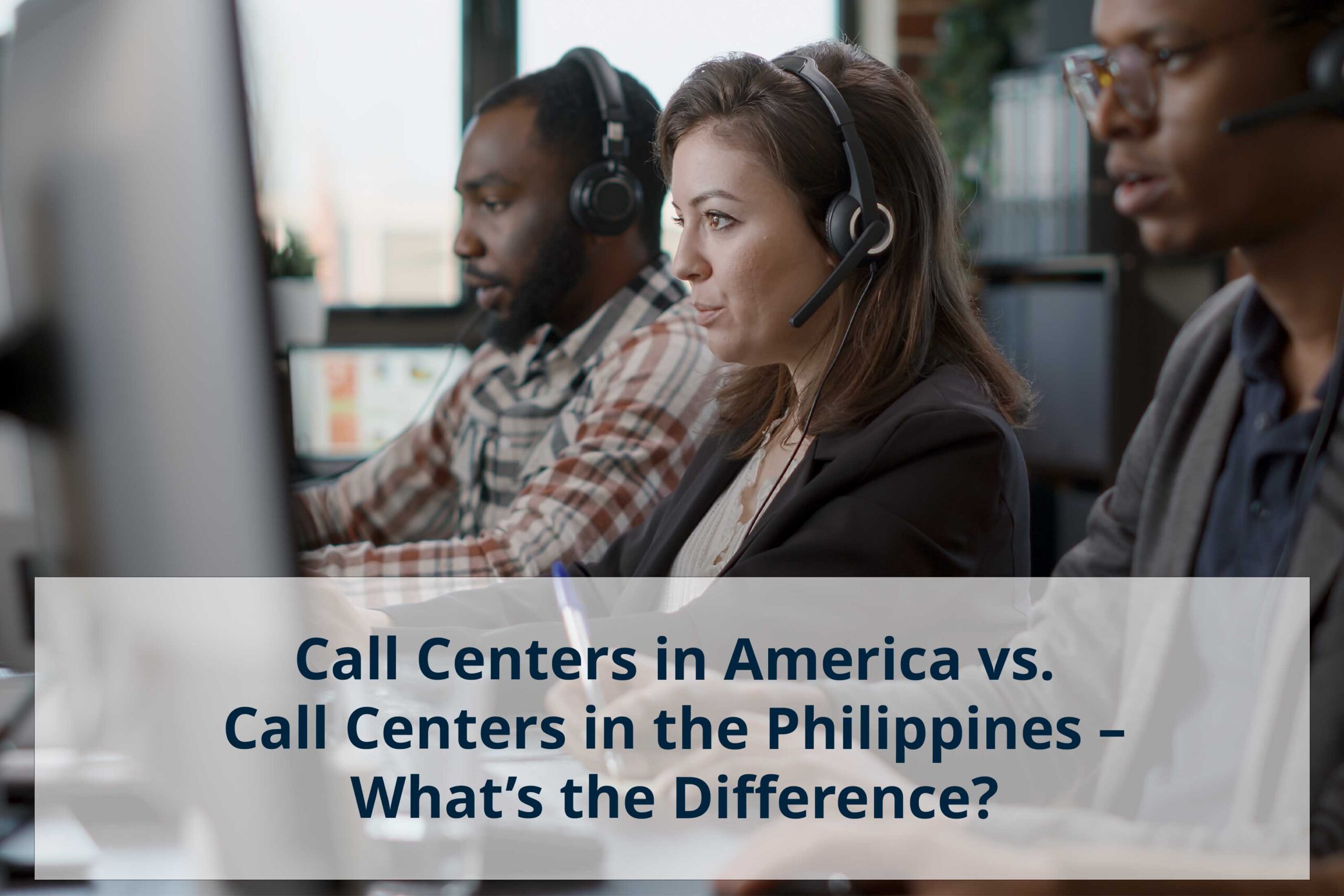In today’s globalized business landscape, call centers play a pivotal role in ensuring expert communication between companies and their customers. And it might be natural to assume that a domestic call center will provide the best service for your American-based customers. In fact, US companies have multiple offshore customer service options that are just as good and may be better.
But the decision to establish call centers in domestic locations, such as the United States, or offshore call center locations, such as the Philippines, involves a range of considerations.
Let’s take a closer look at some of the key factors involved in choosing between call centers in America and call centers in the Philippines.
Priority No. 1 – What’s the cost?
In any business, the main consideration is the bottom line. And there’s no denying that costs vary significantly between American call centers and call centers in the Philippines.
Philippine call centers are always going to win the cost contest. And if you’re worried that this is down to exploitation, don’t be. We’ll look at why the Philippines customer service industry costs American companies less.
Call Center Cost Structure in the United States
Call centers in the United States are subject to higher labor costs due to the higher cost of living and other premiums related to wage culture.
Employee salaries, benefits, and overhead expenses, such as insurance, healthcare and dentistry, memberships, and other perks, contribute significantly to the operational costs of US-based call centers. These running costs come as part and parcel of running a US-based customer service but it can also result in increased expenses for businesses.
Call Center Cost Structure in the Philippines
The Philippines has become a favored offshore destination for call centers due to its lower labor costs. This is not due to exploitation but because the cost of living in the Philippines is notably lower compared to the United States, allowing companies to achieve substantial cost savings.
Cultural differences also mean that Filipino workers often have fewer outgoings. Family is at the heart of Filipino culture. In fact, the concept of “close-knit” takes on new meaning in the Philippines, where extended families often live together or in close proximity. Family members contribute to the running of the home so that the financial responsibility is spread across the household.
It is the availability of a skilled workforce at a fraction of the cost that attracts companies looking to optimize their operational expenditure.
How Do Customer Service and Language Skills Compare?
For any customer service role, the ability to communicate efficiently with your customers or clients is essential. If customers don’t feel “heard”, they’ll go elsewhere.
The most important aspect of great customer care is warmth, expertise, and knowing the company inside out. Would it surprise you to learn you’re just as likely to get these skills from offshore customer service centers as American providers?
Customer Service Workforce Skills in the United States
US-based call centers often benefit from a workforce with strong communication skills and a deep understanding of the local culture and market trends.
But in the US customer service-based jobs are not highly prized. Because of this, the recruitment of skilled customer service professionals can be competitive and costly, impacting the overall efficiency and scale of operations. And, it’s more expensive to train agents in the US too.
Customer Service Workforce Skills in the Philippines
The Philippines has decades-long experience in BPO customer service provision. And working in the industry is seen as a natural progression for many Filipino college graduates.
Also, the country boasts a large pool of English-speaking college alumni who are well-versed in American idioms and cultural nuances. The country’s education system emphasizes English proficiency, making Filipino agents effective in providing customer service to English-speaking customers.
What’s more, Filipino call centers, like Loop Contact Solutions, almost exclusively speak American English making their speech as familiar to your customers as many domestic call center agents. It is this language advantage that has propelled the growth of the Philippine call center industry and makes them so popular with US businesses.
What About the Quality of Service and Customer Experience?
The US are well known for their high levels of customer service. But, can the Philippines match them at their own game?
The Quality of Service and Customer Experience in the United States
US-based call centers provide a high level of service. The ability to empathize with customers and offer personalized solutions contributes to enhancing the customer experience.
However, this high level of service can be provided by offshore call centers too.
Perhaps the only elevated customer experience benefit that domestic agents can offer is their depth of understanding of the range of different cultural experiences in the US. And, possibly, their familiarity with a local market rather than general US market trends.
The Quality of Service and Customer Experience in the Philippines
While cost considerations often drive companies to offshore locations, Philippine call centers have made significant strides in providing the same customer service experience as domestic US call centers.
Training programs that emphasize cultural sensitivity and communication skills help bridge the gap between offshore agents and customers. Many companies, like LOOP, invest in advanced technology to monitor and improve the quality of service and continually educate their teams about US cultural and market nuances.
How Does Time Zone and Distance Affect Services?
Time zone and geographical distances may seem to be a problem with offshore call centers. But with the ease of instant communication allowed by modern technology, the Philippines is at no disadvantage when it comes to time zones or the miles between America and the Philippines.
Time Zone Advantages in the United States
US-based call centers may have a natural advantage when it comes to serving customers within the same time zone. But we shouldn’t forget that the US has six different time zones on main US soil and 11 different time zones when including US islands and dependencies.
So, local customer services teams may be able to offer real-time communication and support which can be crucial in industries where immediate assistance is required. But domestic centers outside of local time zones may offer a variable service depending on the distance.
More importantly, domestic customer service providers are more likely to limit the ability to provide 24/7 service without additional night-shift resources.
24/7 Customer Service Advantages in the Philippines
One of the main benefits of BPO in the Philippines is the 24/7 services that are already part of Filipino work culture. Offshore call centers can offer round-the-clock support, catering to different time zones across the globe. This advantage is particularly appealing to companies that serve international markets.
Another perk is a blended approach to customer service. You may want to use a US domestic service during the day and an offshore service out-of-hours. The 12-hour time zone difference between the Philippines and the US capital city provides the perfect opportunity for extended customer service hours.
How Do Data Security and Privacy Compare?
When dealing with customers’ personal and financial details, security is always a big consideration. But is there really much difference in the security protocols of the US and the Philippines?
Data Regulations in the United States
US-based call centers must adhere to stringent data security and privacy regulations, such as the Health Insurance Portability and Accountability Act (HIPAA) and the Payment Card Industry Data Security Standard (PCI DSS).
Compliance with these regulations is vital to safeguard sensitive customer information, but it can also add complexity to operations.
Data Regulations in the Philippines
Offshore call centers in the Philippines are subject to their own set of data protection regulations, including the Data Privacy Act of 2012.
Many call centers invest in robust cybersecurity measures and comply with international data protection standards to reassure clients of the security of their information. And Filippino customer service providers are also responsible to the NPC – the country’s agency responsible for the implementation and enforcement of the Data Privacy Act.
This regulatory body is tasked with regulating personal data processing, ensuring compliance, and promoting data privacy awareness. Non-compliance with the Data Privacy Act can result in penalties, including fines and imprisonment, as well as civil liabilities.
But What About Cultural Compatibility?
While politics or social movements may not affect your business model hugely, there will be certain companies that rely on up-to-date cultural awareness. So how do Philippine call centers compare to American service providers?
Cultural Compatibility in the United States
US-based call centers have a natural advantage when it comes to cultural compatibility, as agents are intimately familiar with the local culture and customer expectations. This familiarity contributes to effective problem-solving and rapport-building.
But closeness to certain cultural movements may make agents more prone to unconscious bias towards certain trends.
US Cultural Awareness in the Philippines
While Filipino agents may not be native to the culture they are serving, the Philippines has a strong history of cultural assimilation due to historical ties with Western countries. But because small cultural shifts may not affect them directly, Filipino agents remain impartial at all times.
This, combined with the rigorous cultural training that companies like LOOP provide, helps agents understand and adapt to the cultural norms and preferences of their customers.
Conclusion
In the ongoing debate between call centers in America and call centers in the Philippines, it’s evident that each option comes with its own set of considerations. Cost savings, language proficiency, quality of service, time zone advantages, data security, and cultural compatibility are all critical factors that companies must weigh when making their decision.
But there’s no doubt that call centers in the Philippines can provide friendly, Americanized agents who are experts in their field – with significant savings over American call centers.
We at LOOP provide knowledgeable agents, who provide high-performance sales and retention services, and give world-class treatment to each customer from beginning to end. Call center providers, such as LOOP, go the extra mile to be any US company’s customer service powerhouse. ensure a seamless and efficient customer service experience.













